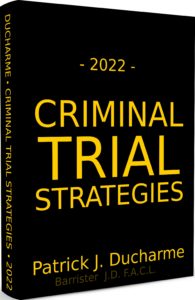Most judges sitting without a jury appreciate counsel providing them with an opening statement of the case. An opening statement to a Judge is similar to an opening statement to the jury in this respect– it should avoid argument(s) on the law. An opening statement to a Judge simply provides counsel with an opportunity to advise on the evidence that is contested and the evidence that will be called to meet the opposition’s evidence. The opening statement should be concise and logical. It should outline, if not precisely define, the contested issues. It should also explain the legal theory or basis of counsel’s case.
Particularly in the long, complex cases, judges rely upon counsel to simplify and explain. They appreciate counsel avoiding repetitious, meandering examinations-in-chief or cross examinations. Trial judges welcome counsel showing respect for the court and appreciating the difficult function the trial Judge performs. Most trial judges are generally pleased with counsel honouring the office that the Judge represents and respecting that office in a way that reflects that respect.. Judges are entitled to interpret the law, and occasionally, even shape the law.
A jury, in contrast, is advised on the law, and, for them, the law remains fixed. The law is to be applied as given to them by the trial Judge. If the trial Judge is wrong in instructing the jury , only an appellate court will assess and or correct a trial Judge’s error(s).
Judges and juries are expected to be interested in arriving at the correct verdict. As mentioned in our section on jury trials, most counsel live by the old cliche that counsel generally selects trial by jury when the facts are sympathetic to the accused. Old adages may have their place in life, but they are often less helpful in trial work. This adage also suggests juries are likely to be more sympathetic than judges, a position that is far from provable.
This questionable philosophy suggests that individual jurors will vote with their heart rather than their intellect. Its corollary is that judges are less likely to decide the case on sympathy for the accused, and more likely to decide the case on the law. rather than emotion. These anecdotal philosophies may be widely held but are obviously not provable.
These theories suggest that because judges are trained to apply the law they may slavishly adhere to their understanding of the law and how it applies to the instant case. Strict adherence to the law, the theory suggests, will not permit a Judge to be swayed by elements of sympathy. This is a theory that I cannot accept. My experience, in fact, is just the opposite.
My experience has been that most judges, are sensitive to and caring about the circumstances of the accused. Many are as affected by sympathetic circumstances in the same manner as jurors. Consequently, I do not believe that counsel should avoid trial by Judge alone based upon a purely anecdotal belief that most trial judges become hardened by the trial process and that they invariably develop an inability to respond to sympathetic circumstances.
Judges, in my experience, like jurors, perceive, feel and react to sympathetic, sensitive or compassionate evidence. The difference between judges and jurors in this regard is , in this lawyer’s opinion often overstated, and likely inaccurate.
Experience does lead me to believe that judges prefer to decide cases in favour of the ‘good guy’ just as much as jurors . Because judges have the ability to interpret and shape the law in any particular instance, and the ability to distinguish the facts of one case from another, applying legal principles only if they fit the case – judges have more ability to respond to sympathetic, sensitive or compassionate evidence than jurors. They are less constrained than jurors.
Judges know and appreciate that evidence of good character, for example, is evidence that not only supports the credibility and reliability of the accused as witness, but is also evidence that can be used to determine that the accused’s character means that he is unlikely to have committed the crime charged. Legal history is replete with cases where judges sitting without a jury have used character evidence to make their findings in favour of an accused.
While jurors are instructed on the use to be made of character evidence, their use of character evidence will generally be devoid of this rich history of law. And, because the jury is not asked to provide reasons for their decision it is impossible to know what impact, if any, the evidence of good character had on their ultimate decision.
Consequently, the decision as to whether to select a jury trial over a Judge alone trial should be considered on a detailed and more sophisticated level than following old adages such as Judge alone trials are preferred when the law is on your side and jury trials are preferred when the facts are on your side. Often the very opposite may be true.
The above is the an excerpt of Patrick J Ducharme’s book, Criminal Trial Strategies, available at Amazon or in bulk through MedicaLegal Publishing.
Read or listen to the Preface and Introduction and subscribe to Patrick Ducharme’s Youtube Channel.

